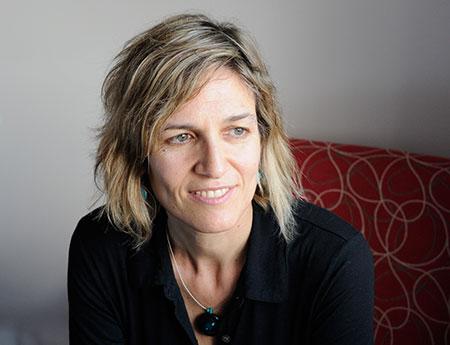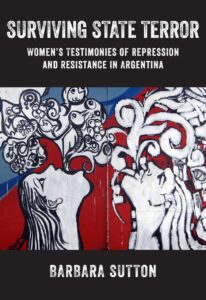
Gerlinger Alumni Lounge 1468 University Street UO campus Free & open to the public
Surviving State Terror: Women’s Testimonies of Repression and Resistance in Argentina
Barbara Sutton, Associate Professor, Department of Women’s, Gender, and Sexuality Studies, University at Albany, State University of New York
Notable: Barbara Sutton is the 2002 CSWS Jane Grant Fellow and a former student of Joan Acker and Sandi Morgen. She completed her PhD in sociology at the University of Oregon in 2004. While at UO, she was co-founder and coordinator of the Social Sciences Feminist Network and the Gender in Latin America RIG.
This presentation is based on Sutton’s recently published book, Surviving State Terror. Based on oral testimonies of women who survived clandestine detention centers during a period of state terrorism in Argentina (1976–83), this book illuminates the gendered and embodied forms of trauma that women endured while also highlighting their historical and political agency.
 Barbara Sutton /photo by Juana Ghersa
Barbara Sutton /photo by Juana GhersaThrough the lens of the body as a cross-cutting theme, the book examines gendered dimensions of experience during captivity and beyond. Sexual violence as a weapon of state terror is addressed, yet the book also shows more subtle dynamics of gender inscription through torture. Similarly, though the study attends to motherhood ideologies and the egregious treatment of pregnant women in captivity, it also explores women’s experiences beyond maternity. Public and scholarly discourse has tended to pay attention to the relatives of the people disappeared, particularly mothers; this book makes a needed contribution by bringing to the fore the stories of women who themselves were forcibly disappeared, but ultimately survived.
 Surviving State Terror incorporates women survivors’ narratives of solidarity, resistance, and political organizing as well as their perspectives on social change, human rights, and democracy. The book draws on the urgent lessons that women survivors offer to a world that continues to grapple with atrocities. In the words of pioneering scholar of gender and militarization, Cynthia Enloe, the book “reveals how our listening to these women is crucial for sustainable democracy.” Distinguished sociologist Cecilia Menjívar adds that the “author masterfully reveals intersections of state terror and gender ideologies with clear relevance across space and time. A must read.”
Surviving State Terror incorporates women survivors’ narratives of solidarity, resistance, and political organizing as well as their perspectives on social change, human rights, and democracy. The book draws on the urgent lessons that women survivors offer to a world that continues to grapple with atrocities. In the words of pioneering scholar of gender and militarization, Cynthia Enloe, the book “reveals how our listening to these women is crucial for sustainable democracy.” Distinguished sociologist Cecilia Menjívar adds that the “author masterfully reveals intersections of state terror and gender ideologies with clear relevance across space and time. A must read.”
Sponsored by the Department of Sociology; Center for the Study of Women in Society; Department of Women’s, Gender and Sexuality Studies; Latin American Studies Program; and the Center for Latino/a and Latin American Studies.
Here also is a link to a recent podcast by Barbara Sutton about the fight in Argentina to legalize abortion: https://www.albany.edu/news/88343.php?utm_source=toa&utm_medium=email&utm_campaign=internal_comm&utm_term=facstaff&utm_content=more

